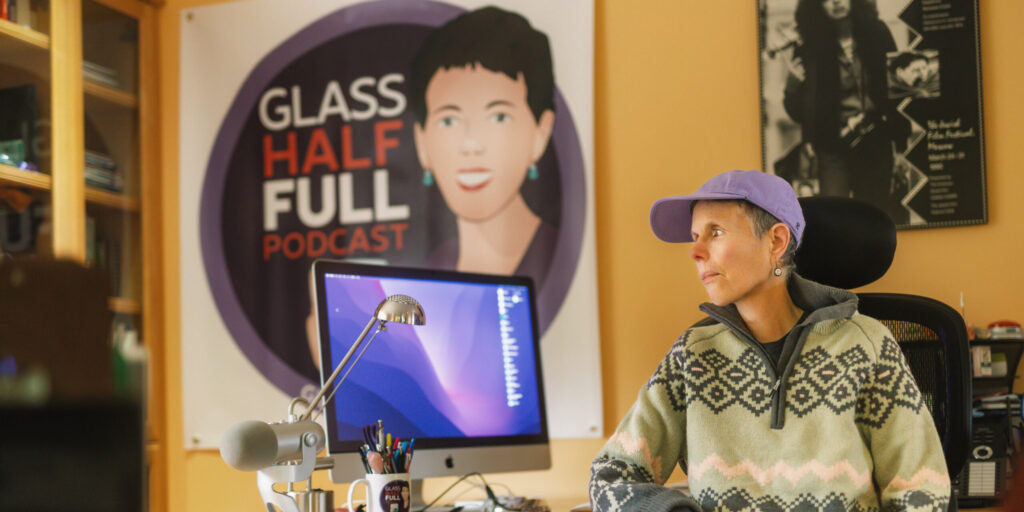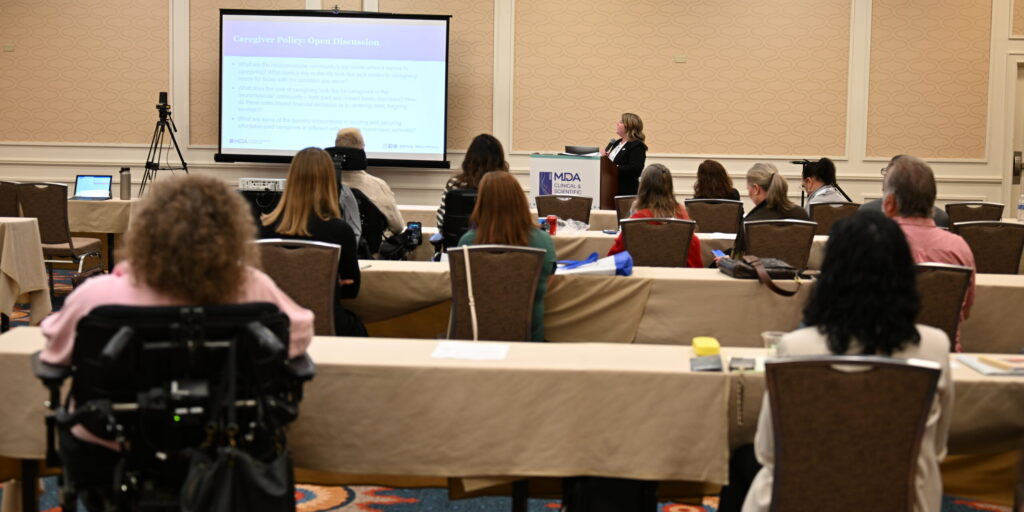
How to Cope When Your Child Is Diagnosed
By Claire Sykes | Friday, April 26, 2024
Receiving your child’s diagnosis of muscular dystrophy or any other neuromuscular disease can evoke a host of emotions. Finding the right support and resources to help you cope with your feelings is the key to taking care of yourself so you can care for your child.
Whatever you feel is normal
“Grief is the primary emotion for parents, and it manifests in many ways,” says Julianne Meiser, MSS, LSW, a social worker at the MDA Care Center at Children’s Hospital of Philadelphia. A tangled mix of emotions can keep you from taking in the diagnosis at first. “Initially, for some, it’s shock,” says Julianne. “Outright denial of a diagnosis is also common.”
You can also experience conflicting emotions, such as relief at getting an explanation for why your child is missing motor milestones or can’t run like their peers, while, at the same time, sadness, fear, or frustration. “Sometimes parents feel angry at the doctor who gave the diagnosis or the ones before who couldn’t determine the cause of their child’s symptoms,” says Tara Jones, MS, LCGC, a neurology genetic counselor at the MDA Care Center at Cedars-Sinai Medical Center.

Cory Smid, MGCS, CGC, is a genetic counselor at the MDA Care Center at University of Wisconsin Health.
Some people turn their critical gaze inward. “Many parents wish they’d noticed their child’s symptoms sooner or had pushed harder for their pediatrician to look more closely at them,” says Julianne. “In reality, people do the best they can with the information they have.” Still, it’s only natural to feel guilt.
“Guilt is a common and powerful emotion for parents,” says Cory Smid, MGCS, CGC, a genetic counselor at the MDA Care Center at University of Wisconsin Health. “Many neuromuscular diseases diagnosed in infants and young children are hereditary, and parents can feel it’s their fault. But no one picks what genes are passed on.”
You may worry about the disease’s recurrent risks for your other children or those you want to have. For something that’s completely out of anyone’s hands, guilt offers a semblance of control.
Attend to yourself
Use these strategies to cope with your feelings so you feel less overwhelmed and more in control:
- Accept your emotions. Allow yourself to feel without judging, dismissing, or downplaying your feelings. “Then you can experience them constructively,” says Julianne.
- Name the feelings. This helps diffuse them and ease the burden they create. “Talking with people you trust can help you identify your emotions, and then you can begin to process them,” Julianne continues.
- Be active. Move through your emotions by moving your body, being with nature, making crafts, or engaging in hobbies and other enjoyable pastimes.
- Go at your own pace. “You’re allowed to take as much time as you need and go as quickly or slowly as you like. There’s not one way,” says Cory.
- Cultivate healthy habits. Try to get enough exercise, sleep, nourishing meals, and quiet time alone or with loved ones.
- Get informed. Start with the MDA Resource Center for one-on-one help finding resources and programs for your child.
- Seek support. Join an MDA Community Group to share with others who understand and care, and find support through the MDA Mental Health Hub.
- Educate yourself. Take an MDA Access Workshop, and download MDA’s Print-Ready Educational Materials and Disease Fact Sheets to learn about your child’s disease.
- Understand the diagnosis. Learn all you can about neuromuscular diseases, treatments, and the latest research.
- Get virtual guidance. Attend MDA’s free, online Next Step Seminars for concrete actions you can take upon facing a diagnosis and other major life changes.
- Trust yourself. “Think about challenges you experienced in the past and how you dealt with them, and try applying that to your situation now,” says Tara.

Julianne Meiser, MSS, LSW, is a social worker at the MDA Care Center at Children’s Hospital of Philadelphia
Be there for your child
As you cope with your emotions, you may struggle with how much to tell your child about their diagnosis. Julianne recommends reaching out to a child life specialist, physician, genetic counselor, or social worker to discuss appropriate options for your child. Your MDA Care Center can recommend these professionals.
When you’re ready to talk with your child, be open and honest. “Tell them they did nothing wrong to receive their diagnosis and that it gives a reason why they’ve had a hard time with their muscles,” says Vikki A. Stefans, MD, a Pediatric Physiatrist and MDA Care Center Diagnostic Physician at Arkansas Children’s Hospital. “Promise them you’ll be there for them and answer any questions. Then they won’t be afraid to ask you instead of going online and reading old or inaccurate news about the disease.”
Live well, and with hope
Most of all, remember that life with a neuromuscular disease may be different, but it can still be good. Kids with neuromuscular diseases can and do dream big and lead fulfilling lives.
It’s important that your child continues regular activities and maintains a consistent schedule as much as possible. You, too. “Don’t let their diagnosis uproot your life,” says Julianne. Focus on the things that don’t need to change and the things you enjoy.
In addition, keep in mind we’re living in a promising time for neuromuscular disease treatment. In the last decade, more than 20 new drugs have been approved to treat neuromuscular diseases, and about 165 potential therapies are currently in the clinical trial stage.
“Many people are working on cures and treatments and making a difference,” Vikki says. “There’s a world of people who care out there.”
Next Steps and Useful Resources
- Wondering if and how to tell others about your child’s diagnosis? Read Talking About Your Child’s Diagnosis Helps Build Your Support System.
- Find more Quest Media articles about parenting.
- Learn about MDA Summer Camp for kids and young adults with neuromuscular diseases.
- Stay up-to-date on Quest content! Subscribe to Quest Magazine and Newsletter.
TAGS: Community, Community Education, Featured Content, MDA Care Centers, MDA Resource Center, Mental Health, Parenting, Resources
TYPE: Blog Post
Disclaimer: No content on this site should ever be used as a substitute for direct medical advice from your doctor or other qualified clinician.




